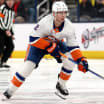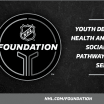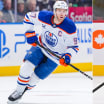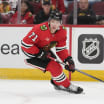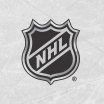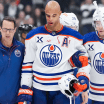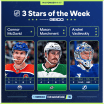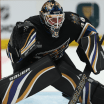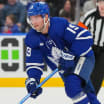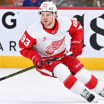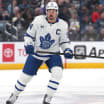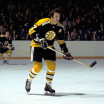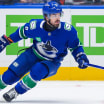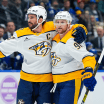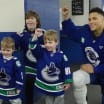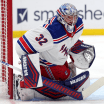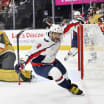Olczyk 'humbled, honored' to be Hockey Fights Cancer ambassador
'NHL on NBC' analyst who overcame colon cancer hopes to spread word about early testing, importance of caregivers
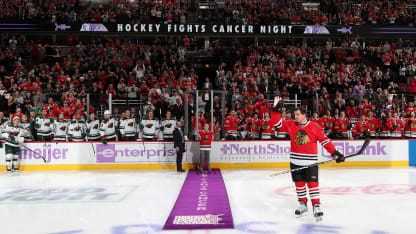
© Chase Agnello-Dean/Getty Images
The analyst for "NHL on NBC" and the Chicago Blackhawks has been free of cancer since March 2018 after he was diagnosed with stage 3 colon cancer on Aug. 4, 2017. He's working his usual busy hockey broadcasting schedule, which is more than 120 regular-season and Stanley Cup Playoff games. But cancer will always be in the back of his mind.
"I mean, I've lost all the weight I gained. I gained 50 pounds when I was sick. I think I'm pretty much kind of back to feeling relatively normal," the 53-year-old said. "Every day you wake up and if you feel something -- and anybody's who's been sick knows you become overly sensitive and paranoid -- you're thinking, 'oh, geez, what is that?' Then when you get ready to go to the doctor's office, there's that anxiety that builds up. But I feel good. I'm pretty lucky."
RELATED: [Complete Hockey Fights Cancer coverage]
Olczyk has done much to bring awareness to colon cancer, and he'll continue to do so as the NHL Hockey Fights Cancer Ambassador for 2019-20.
"It's a great initiative," Olczyk said. "The League's done so many great things away from the rink. But I would make the argument that, when you look at what they've done and the awareness and everybody buying in like they do -- that's what's so great, that all the teams buy in and make a difference in someone's life for maybe a day."
The American Cancer Society and Canadian Cancer Society return as national partners for the League-wide campaign. Donations raised through HockeyFightsCancer.com will support both organizations, providing support for people with cancer and their families. Funds go toward covering the costs of accommodations, meals, transportation and emotional support for patients who are often displaced from their homes in order to undergo treatments. Movember Canada also returns, focusing on men's health. Donations support pre- and post-treatment for men battling prostate cancer.
Olczyk, who will be signing his new book, "Eddie Olczyk: Beating the Odds in Hockey and In Life," at the NHL Store NYC in Manahattan on Nov. 5 from 5-6 p.m., talked with NHL.com about his role of Hockey Fighrs Cancer Ambassador and the importance of getting screened for colon cancer.
What does it mean to you being named the Hockey Fights Cancer ambassador?
"I was really honored and humbled when the League called and Liz Johnston and the social impact team that manages the Hockey Fights Cancer initiative asked me if I would be the ambassador. No hesitation at all. I mean, just to have them think of me and hopefully I'll be able to make a difference like the League has done since '98 and all the money they've raised and everything. I'm very, very touched and there's nothing else to say. It was just very appreciated and hopefully I can make a difference, and not only this month, because cancer's going to be with me for the rest of my life. I just continue to do what I do, whether it's during Hockey Fights Cancer month or, you know, some time in February or March."
I'm guessing you can't stress enough that people have a colorectal cancer screening?
"Look, when I got sick, the recommended age for a colonoscopy was 50, and I was 10 months overdue. Would that have made a difference? Probably not, because the tumor had already developed. If I would have had a colonoscopy when I was 45, I may have been able to stay away from the chemo. And since I got sick, [the American Cancer Society] has lowered the recommended age to 45. So obviously the numbers [for colon cancer] are up. It's scary, but if someone can hear my story and know what I went through, then maybe someone will say, 'hey, I'm not going to put it off.' Because a lot of people end up putting it off and just go, 'it's not going to happen to me. I'm going to do it later, do it later, do it later.' Then all of a sudden, someone's going in and getting the bad news.
"Really it's a couple of different things. One, be proactive and try to be preventative. But also, if you're not feeling well, it's OK to raise your hand and say something. And most important, if there's someone out there who's battling, if they know my story or help them in any way with how I dealt with it, I can be more relatable to them. When you talk to someone who doesn't have cancer, there's a connect, but it's not in sync. But then when you talk to someone who's gone through the same thing you do, it's very seamless. There's instantaneous connection. But I hope that people will be proactive because I would trade in everything I went through if I could have been screened earlier.
"Call your doctor, demand you want to have it done. And if you have a family history, you're well within your right to get in there and get it done earlier. Look, my kids are going to have to be screened a lot earlier than most people. And just make sure they're being proactive."
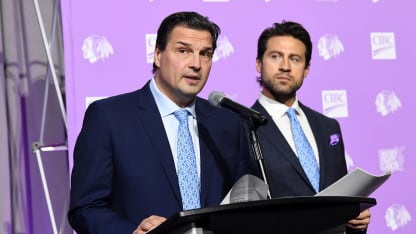
© Bill Smith/Getty Images
Eddie Olczyk hosts the Chicago Blackhawks' Hockey Fights Cancer night with Adam Burish on Oct. 27. Photo by Getty
You've talked many times about the support you got from family and friends throughout your cancer fight. How much did it help you?
"The support I got was from Day One. And when you're so-called in the public eye and you are keeping something like this very secretive and you're missing a charity hockey game and you miss an autograph appearance and you're putting your kids in a bad spot to tell people you're sick and not feeling good, I almost felt better when it became public. We put out that statement with the Blackhawks and NBC and it was almost like, 'OK, everybody knows I'm sick,' and I felt better after that. But the support, I said it, I couldn't have done it by myself. I'll be thanking people for the rest of my life, people I know or people I don't know who would shoot me a text or a well wish or a hug. Someone was asking about me, and I don't know why, but it helped. And I've always said, if someone out there you know is not feeling well or is in a battle or is being challenged, pick up the phone, call them or text him or her or go visit them. And I had that. I don't know why, but I had an incredible support system and it all started at home and it filtered in to the game that brought me everything I have in my life. Paybacks are positive and hopefully I can do the same thing now to maybe people who are struggling or are in a battle and can maybe relate to me a little bit more, and especially with being the ambassador. It's humbling."
How gratifying is it for you to be able to now say you are free of cancer?
"I mean, I'm very lucky and I don't know what else to say. I couldn't have done it by myself. It's something my wife and I, we talk about it in the book, but I think what's kind of evolved with this is a lot of people I've talked to, they're glad of the attention that caretakers and caregivers are getting now because they're going through a lot. It's the one thing that really, my wife and I have taken head on is just to make sure that we continue to spread the word to people and let them know how important caretakers and caregivers are, because they're going through a lot, too. That keeps me going.
"It's always going to be with me and anytime anybody sees me it's, 'hey, how you feeling?' And that's OK and I'm grateful for that. But if we can make a difference in this big puzzle of this disease, then it was well worth the initiative and well worth it being part of Hockey Fights Cancer. If you can help one person, I've said that lots of times, and I'd like to think it's going to be more than one person."
Your book covers everything from your fight with cancer to your hockey career to horse racing. How cathartic was it to put pen to paper?
"I had a lot of time to reflect. I didn't just want it to be about a kid from Chicago who made it to the NHL, making the Olympic team when I was 17. I don't want to say that I was ever bullied, but I was made fun of, people thought that I was a big kid. I say in the book, right, that some people said I may eat my way out of the NHL, right? It's a form of bullying, right? That wasn't the word then. But I laid it all out there. I didn't pull any punches, especially with the cancer and the people who have been important in my life and the people who challenge me in my life.
"I wanted people to laugh, I figured people would cry, and then I'm hoping that people will love a little bit more. And that's kind of what the goal was. I'm proud of how it came out. It's long, and [co-author] Perry Lefko did a great job with helping me along. He knew when to push me, he knew when to back off. There were some tumultuous conversations and sit-downs, but we had a goal and I think we accomplished it."
Each of your four children, Tom, Eddie, Nick and Zandra, wrote an entry in the afterword of the book. How emotional was that for you?
"It was an idea we brainstormed, and we said, 'let's have them put pen to paper and what they saw when they got the news of their dad.' And I didn't read it until the book was out. I purposely did not want to read what they felt. And it was hard. It took me three or four days to get through each one, because as a parent, the last thing you want to do is worry or hurt your kids."
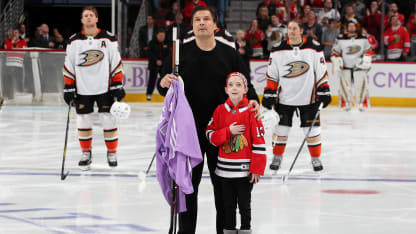
© Chase Agnello-Dean/Getty Images
Eddie Olczyk and 9-year-old cancer patient Lauren Graver stand for the national anthem during the Blackhawks' Hockey Fights Cancer night in November 2017, three months after the 'NHL on NBC' analyst was diagnosed with colon cancer. Photo by Getty
Sometimes when people go through a traumatic event they say it changed their outlook on life. Has this changed yours?
"I was at peace when I was sick, because the most important people in my life knew how I felt about them. And if I got the news that, 'Hey, you know what, Edzo, it's time. That's it.' I knew that everybody in my life was taken care of. So, if anything, what it did for me is it reassured me I was in a pretty damn good place before I got sick. It starts with family, it starts with the people most important in my life knowing how I feel about them. And reflecting on what I've been able to do and accomplish. Everyone has goals and dreams, you know? Is there another chapter or chapters to be written? That's all to be known.
"If anything, if I'm sitting in traffic today, maybe [I'm calmer] in those situations, the petty things, someone cuts you off. I dodged a massive obstacle in my life, I know that.
"I reflect back on my career and you know what? I was a pretty good player and I had a great career. Will that end up being my legacy? I hope not now, just because of what I've been able to take on and hopefully make an impact in the community. Because at the end of the day, we're all part of the community and we all want to be loved and want to live a great life. But if somebody can say that, 'hey, he had an impact on me or he made an impact in this part of our everyday goings-on,' then that's a good thing."
